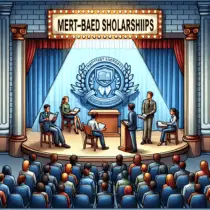
How to write a scholarship appeal letter if you are denied or have a change in financial circumstances
A scholarship appeal letter is a document you can submit to a scholarship committee or a financial aid office to request more funding for your education. You may need to write an appeal letter if you have been denied a scholarship, have experienced a change in your financial circumstances, or have made a mistake on your application.
Writing an appeal letter can be challenging, especially if you are unsure how to present your case effectively. However, following some simple steps and guidelines can increase your chances of getting a positive response from the scholarship provider. In this article, we will show you how to write a scholarship appeal letter explaining your situation and requesting reconsideration. We will also provide some examples of writing a polite and persuasive appeal letter demonstrating your need and merit.
Step 1: Determine whether you are eligible for an appeal
Before you write your appeal letter, you must check whether you are eligible for an appeal. Different scholarships have different criteria and policies for appealing their decisions. Some scholarships may not allow appeals, while others may have specific deadlines and requirements for appeal submission. You can find this information on the scholarship website, the rejection letter, or by contacting the scholarship committee or the financial aid office.
If you are eligible for an appeal, you should also identify why you are appealing. Three common scenarios may warrant an appeal:
- You have been denied a scholarship, and you believe that the decision was unfair or based on inaccurate information.
- You have experienced a change in your financial circumstances since applying for the scholarship, such as a loss of income, a medical emergency, or a family crisis.
- You have made a mistake on your scholarship application, such as providing incorrect or incomplete information, and you want to correct it.
Depending on the reason for your appeal, you may need to provide additional documents or evidence to support your claim. For example, you may need to submit a copy of your tax returns, bank statements, medical bills, or letters of recommendation. You should gather these documents before you write your appeal letter and attach them to your letter as proof of your situation.
Step 2: Fulfill your scholarship’s requirements for an appeal
Once you have determined that you are eligible for an appeal and have gathered the necessary documents, you should follow the instructions and guidelines provided by the scholarship provider. These may include:
- The format and length of your appeal letter. Some scholarships may require a specific template, font, or margin size. Others may limit your letter to a certain number of words or pages.
- The mode and method of submission. Some scholarships may accept appeals via email, mail, or online portal. Others may require you to submit your appeal in person or by phone. You should also check whether you must include any additional forms or signatures with your appeal letter.
- The deadline and timeline for your appeal. Some scholarships may have a strict deadline for submitting your appeal, while others may allow you to appeal within a certain period after receiving the decision. You should also find out how long it will take for the scholarship provider to review your appeal and when you can expect a response.
You should follow these requirements carefully and precisely, as failing to do so may result in your appeal being rejected or ignored. You should also keep a copy of your appeal letter and any supporting documents for your records.
Step 3: Write a clear and concise appeal letter
After you have fulfilled the requirements for your appeal, you can start writing your appeal letter. Your appeal letter should be clear, concise, and respectful. It should also include the following elements:
- A salutation. You should address your letter to the person or committee responsible for reviewing your appeal. You can find their name and title on the scholarship website or the rejection letter. If unsure who to address, you can use a generic salutation, such as “Dear Scholarship Committee” or “To Whom It May Concern.”
- An introduction. You should introduce yourself and state the purpose of your letter. You should also mention the name and amount of the scholarship you applied for and the date you received the decision. For example, you can write: “My name is John Doe and I am a freshman at ABC University. I am writing to appeal the decision to deny me the XYZ Scholarship of $5,000, which I received on April 1, 2023.”
- A body. You should explain the reason for your appeal and provide evidence to support your claim. You should also demonstrate your need and merit for the scholarship and how it will help you achieve your academic and career goals. You should use specific examples and facts to back up your statements. For example, you can write: “I believe that the decision to deny me the scholarship was based on inaccurate information. I submitted my application on March 15, 2023, but due to a technical error, it was not received by the scholarship committee until March 31, 2023. As a result, my application was not considered in the first round of selection. I have attached a screenshot of the confirmation email I received on March 15, 2023, as well as a letter from the IT department of ABC University, confirming the technical error and the date of submission of my application. I hope that you will reconsider my application in light of this new information.”
- A conclusion. You should summarize your main points and restate your request for reconsideration. You should also thank the scholarship provider for their time and attention and express your interest and enthusiasm for the scholarship. For example, you can write: “In conclusion, I respectfully request that you review my application again and reconsider your decision to deny me the XYZ Scholarship. I am very grateful for the opportunity to apply for this scholarship and I am confident that I meet the eligibility and selection criteria. This scholarship would make a significant difference in my ability to pursue my education and achieve my goals. Thank you for your time and consideration. I look forward to hearing from you soon.”
- A signature. You should end your letter with a formal closing, such as “Sincerely” or “Respectfully”, followed by your name and contact information. You should also include your student ID number if applicable.
Step 4: Proofread and edit your appeal letter
Before you submit your appeal letter, you should proofread and edit it carefully. You should check for any spelling, grammar, punctuation, or formatting errors. You should also make sure that your letter is clear, concise, and coherent. You can use online tools, such as Grammarly or Hemingway, to help you with this process. You can also ask someone else, such as a friend, a family member, or a teacher, to read your letter and give you feedback.
Examples of scholarship appeal letters
To help you write your own scholarship appeal letter, here are some examples of appeal letters for different scenarios. You can use these examples as templates or inspiration for your own letter, but you should not copy them word for word. You should also customize your letter according to your specific situation and the requirements of the scholarship provider.
Example 1: Appeal letter for being denied a scholarship
Dear Scholarship Committee,
My name is Jane Doe and I am a sophomore at ABC University. I am writing to appeal the decision to deny me the XYZ Scholarship of $10,000, which I received on May 1, 2023.
I believe that the decision to deny me the scholarship was unfair and based on incomplete information. I applied for the scholarship on April 15, 2023, and submitted all the required documents, including my transcript, resume, essay, and two letters of recommendation. However, due to a clerical error, one of my letters of recommendation was misplaced and not included in my application. As a result, my application was not evaluated properly and I was rejected for the scholarship.
I have attached a copy of the missing letter of recommendation, as well as a letter from the registrar of ABC University, confirming the clerical error and the date of submission of my letter. I hope that you will reconsider my application in light of this new information.
I am very interested and qualified for the XYZ Scholarship. I have a GPA of 3.9 and I am majoring in biology, with a minor in chemistry. I am also involved in various extracurricular activities, such as the Science Club, the Student Government, and the Volunteer Center. I have received several awards and honors for my academic and leadership achievements, such as the Dean’s List, the President’s Award, and the National Honor Society.
This scholarship would help me greatly in pursuing my education and career goals. I aspire to become a medical researcher and contribute to the advancement of science and medicine. I plan to apply for a PhD program in biomedical sciences after graduating from ABC University. However, I come from a low-income family and I rely on financial aid and scholarships to pay for my tuition and expenses. Without this scholarship, I may not be able to afford to continue my studies and achieve my dreams.
In conclusion, I respectfully request that you review my application again and reconsider your decision to deny me the XYZ Scholarship. I am very grateful for the opportunity to apply for this scholarship and I am confident that I meet the eligibility and selection criteria. This scholarship would make a significant difference in my ability to pursue my education and career goals. Thank you for your time and consideration. I look forward to hearing from you soon.
Sincerely,
Jane Doe
Student ID: 123456789
Email: [email protected]
Phone: (123) 456-7890
Example 2: Appeal letter for a change in financial circumstances
Dear Financial Aid Office,
My name is John Doe, and I am a junior at ABC University. I am writing to appeal for more financial aid for the upcoming academic year, 2023-2024.
I am currently receiving a financial aid package of $15,000, including a $10,000 scholarship and a $5,000 loan. This financial aid package covers most of my tuition and expenses, which amount to $18,000 per year. However, I have recently experienced a significant change in my financial circumstances, which has affected my ability to pay for my education.
On June 1, 2023, my father, who is the sole breadwinner of our family, lost his job due to the COVID-19 pandemic. He has been unable to find another job since then and we have been living on our savings and unemployment benefits. Our monthly income has dropped from $4,000 to $1,500, barely enough to cover our basic living expenses, such as rent, food, and utilities. We have no extra money to pay for my education or any other unexpected costs.
I have attached a copy of my father’s termination letter and our recent bank statements and tax returns to verify our financial situation. I have also applied for a part-time job on campus but have not received any offers yet. I am doing my best to reduce my expenses and find other sources of income, but I still need more financial aid to continue my studies at ABC University.
I am very committed and dedicated to my education and career goals. I have a GPA of 4.0, and I am majoring in computer science with a minor in mathematics. I am also involved in various extracurricular activities, such as the Coding Club, the Math Team, and the Robotics Club. I have received several awards and honors for my academic and technical achievements, such as the Dean’s List, the Best Programmer Award, and the National Science Fair.
This financial aid package is crucial for me to pursue my education and career goals. I aspire to become a software engineer and create innovative solutions for real-world problems. I plan to apply for a master’s program in computer science after graduating from ABC University. However, I come from a low-income family, and I rely on financial aid and scholarships to pay for my tuition and expenses. Without more financial aid, I may not be able to afford to continue my studies and achieve my dreams.
In conclusion, I respectfully request that you review my financial aid package and consider increasing my scholarship or grant amount for the upcoming academic year. I am very grateful for the financial aid and support I have received so far, and I am confident that I meet the academic and financial criteria for more aid. This financial aid package would significantly impact my ability to pursue my education and career goals. Thank you for your time and consideration.
I look forward to hearing from you soon.
Sincerely,
John Doe
Student ID: 987654321
Email: [email protected]
Phone: (987) 654-3210
Example 3: Appeal letter for a mistake on the scholarship application
Dear Scholarship Committee,
My name is Jane Doe, and I am a senior at ABC High School. I am writing to appeal the decision to disqualify me from the XYZ Scholarship of $2,000, which I received on April 1, 2023.
I believe that my decision to disqualify me from the scholarship was based on a mistake in my application. I accidentally entered the wrong SAT score on the online application form. I entered 1400 instead of 1500, the minimum score required for the scholarship. This was a typo and not an attempt to deceive or misrepresent myself.
I have attached a copy of my official SAT score report and a screenshot of the online application form to prove my actual score and the mistake I made. I hope you will reconsider my application in light of this new information.
I am very interested and qualified for the XYZ Scholarship. I have a 3.8 GPA and have taken several advanced placement courses, such as calculus, physics, and literature. I am also involved in various extracurricular activities, such as the Debate Team, the Chess Club, and the Model United Nations. I have received several awards and honors for my academic and extracurricular achievements, including the National Merit Scholarship, the State Champion in Debate, and the Outstanding Delegate in Model UN.
This scholarship would help me greatly in pursuing my education and career goals. I have been accepted to ABC University, where I intend to major in political science and minor in economics. I aspire to become a lawyer and advocate for human rights and social justice. I plan to apply for law school after graduating from ABC University. However, I come from a single-parent family, and I rely on financial aid and scholarships to pay for my tuition and expenses. Without this scholarship, I may not be able to afford to attend ABC University and achieve my goals.
In conclusion, I respectfully request that you review my application again and reconsider your decision to disqualify me from the XYZ Scholarship. I am very grateful for the opportunity to apply for this scholarship, and I am confident that I meet the eligibility and selection criteria. This scholarship would significantly impact my ability to pursue my education and career goals. Thank you for your time and consideration.
I look forward to hearing from you soon.
Sincerely,
Jane Doe
Email: [email protected]
Phone: (123) 456-7890









